Case Study: Medical Assessment of Dementia and Alzheimer's
VerifiedAdded on 2019/12/03
|7
|1213
|106
Homework Assignment
AI Summary
This assignment presents a detailed case study focusing on the medical assessment of an 84-year-old man exhibiting symptoms of dementia. The analysis explores potential risk factors, including age and memory loss, and considers other diagnoses such as Alzheimer's and delirium. The document e...
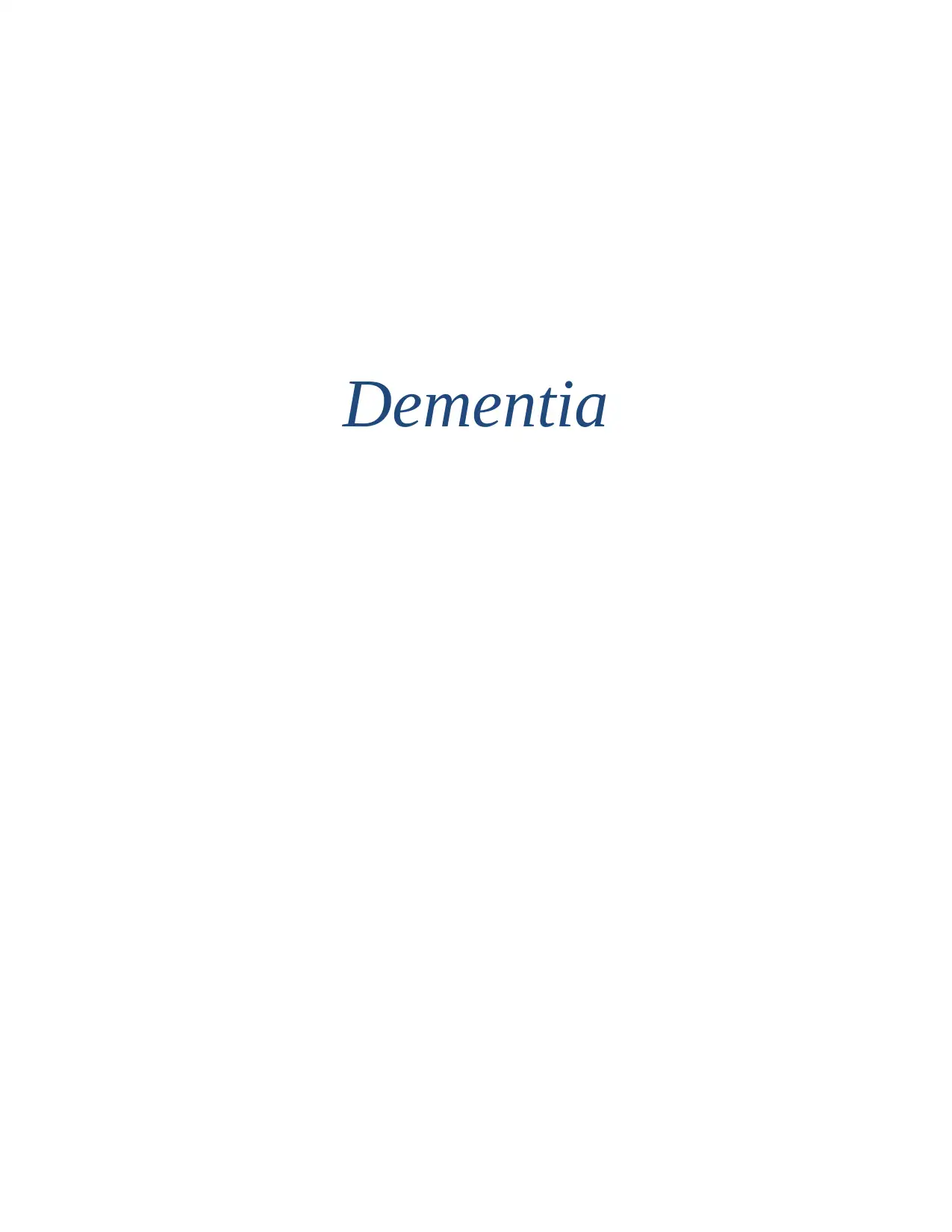
Dementia
Paraphrase This Document
Need a fresh take? Get an instant paraphrase of this document with our AI Paraphraser
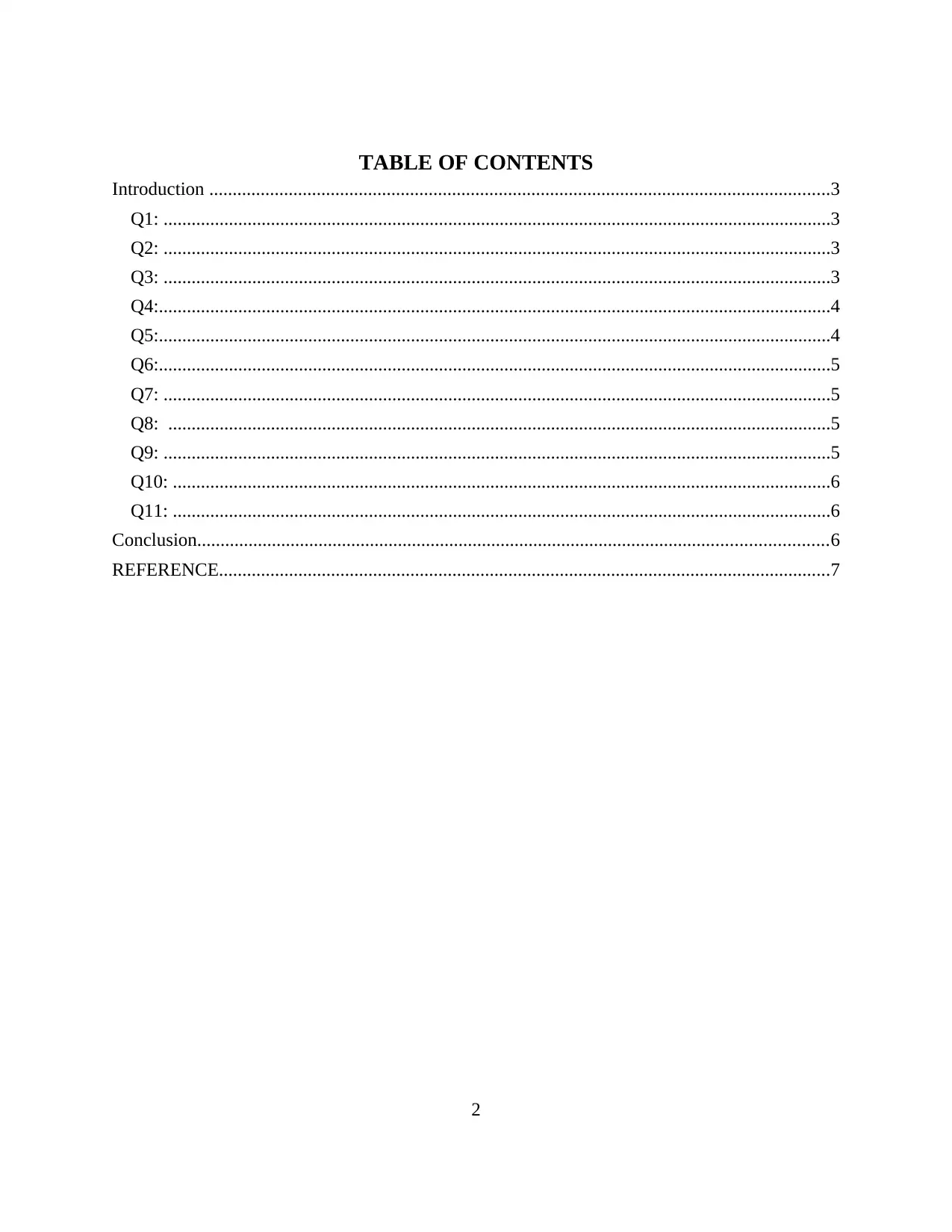
TABLE OF CONTENTS
Introduction .....................................................................................................................................3
Q1: ...............................................................................................................................................3
Q2: ...............................................................................................................................................3
Q3: ...............................................................................................................................................3
Q4:................................................................................................................................................4
Q5:................................................................................................................................................4
Q6:................................................................................................................................................5
Q7: ...............................................................................................................................................5
Q8: ..............................................................................................................................................5
Q9: ...............................................................................................................................................5
Q10: .............................................................................................................................................6
Q11: .............................................................................................................................................6
Conclusion.......................................................................................................................................6
REFERENCE...................................................................................................................................7
2
Introduction .....................................................................................................................................3
Q1: ...............................................................................................................................................3
Q2: ...............................................................................................................................................3
Q3: ...............................................................................................................................................3
Q4:................................................................................................................................................4
Q5:................................................................................................................................................4
Q6:................................................................................................................................................5
Q7: ...............................................................................................................................................5
Q8: ..............................................................................................................................................5
Q9: ...............................................................................................................................................5
Q10: .............................................................................................................................................6
Q11: .............................................................................................................................................6
Conclusion.......................................................................................................................................6
REFERENCE...................................................................................................................................7
2
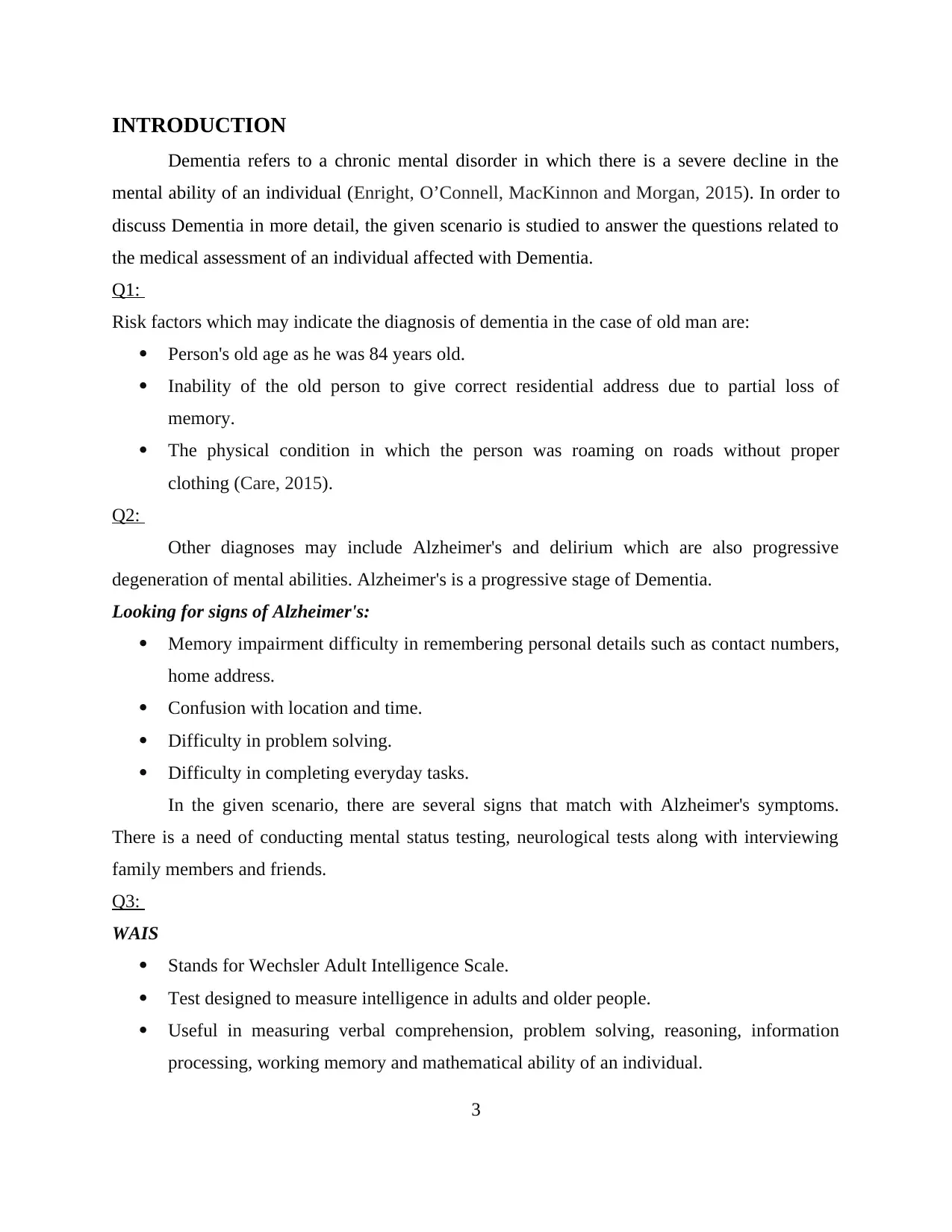
INTRODUCTION
Dementia refers to a chronic mental disorder in which there is a severe decline in the
mental ability of an individual (Enright, O’Connell, MacKinnon and Morgan, 2015). In order to
discuss Dementia in more detail, the given scenario is studied to answer the questions related to
the medical assessment of an individual affected with Dementia.
Q1:
Risk factors which may indicate the diagnosis of dementia in the case of old man are:
Person's old age as he was 84 years old.
Inability of the old person to give correct residential address due to partial loss of
memory.
The physical condition in which the person was roaming on roads without proper
clothing (Care, 2015).
Q2:
Other diagnoses may include Alzheimer's and delirium which are also progressive
degeneration of mental abilities. Alzheimer's is a progressive stage of Dementia.
Looking for signs of Alzheimer's:
Memory impairment difficulty in remembering personal details such as contact numbers,
home address.
Confusion with location and time.
Difficulty in problem solving.
Difficulty in completing everyday tasks.
In the given scenario, there are several signs that match with Alzheimer's symptoms.
There is a need of conducting mental status testing, neurological tests along with interviewing
family members and friends.
Q3:
WAIS
Stands for Wechsler Adult Intelligence Scale.
Test designed to measure intelligence in adults and older people.
Useful in measuring verbal comprehension, problem solving, reasoning, information
processing, working memory and mathematical ability of an individual.
3
Dementia refers to a chronic mental disorder in which there is a severe decline in the
mental ability of an individual (Enright, O’Connell, MacKinnon and Morgan, 2015). In order to
discuss Dementia in more detail, the given scenario is studied to answer the questions related to
the medical assessment of an individual affected with Dementia.
Q1:
Risk factors which may indicate the diagnosis of dementia in the case of old man are:
Person's old age as he was 84 years old.
Inability of the old person to give correct residential address due to partial loss of
memory.
The physical condition in which the person was roaming on roads without proper
clothing (Care, 2015).
Q2:
Other diagnoses may include Alzheimer's and delirium which are also progressive
degeneration of mental abilities. Alzheimer's is a progressive stage of Dementia.
Looking for signs of Alzheimer's:
Memory impairment difficulty in remembering personal details such as contact numbers,
home address.
Confusion with location and time.
Difficulty in problem solving.
Difficulty in completing everyday tasks.
In the given scenario, there are several signs that match with Alzheimer's symptoms.
There is a need of conducting mental status testing, neurological tests along with interviewing
family members and friends.
Q3:
WAIS
Stands for Wechsler Adult Intelligence Scale.
Test designed to measure intelligence in adults and older people.
Useful in measuring verbal comprehension, problem solving, reasoning, information
processing, working memory and mathematical ability of an individual.
3
You're viewing a preview
Unlock full access by subscribing today!
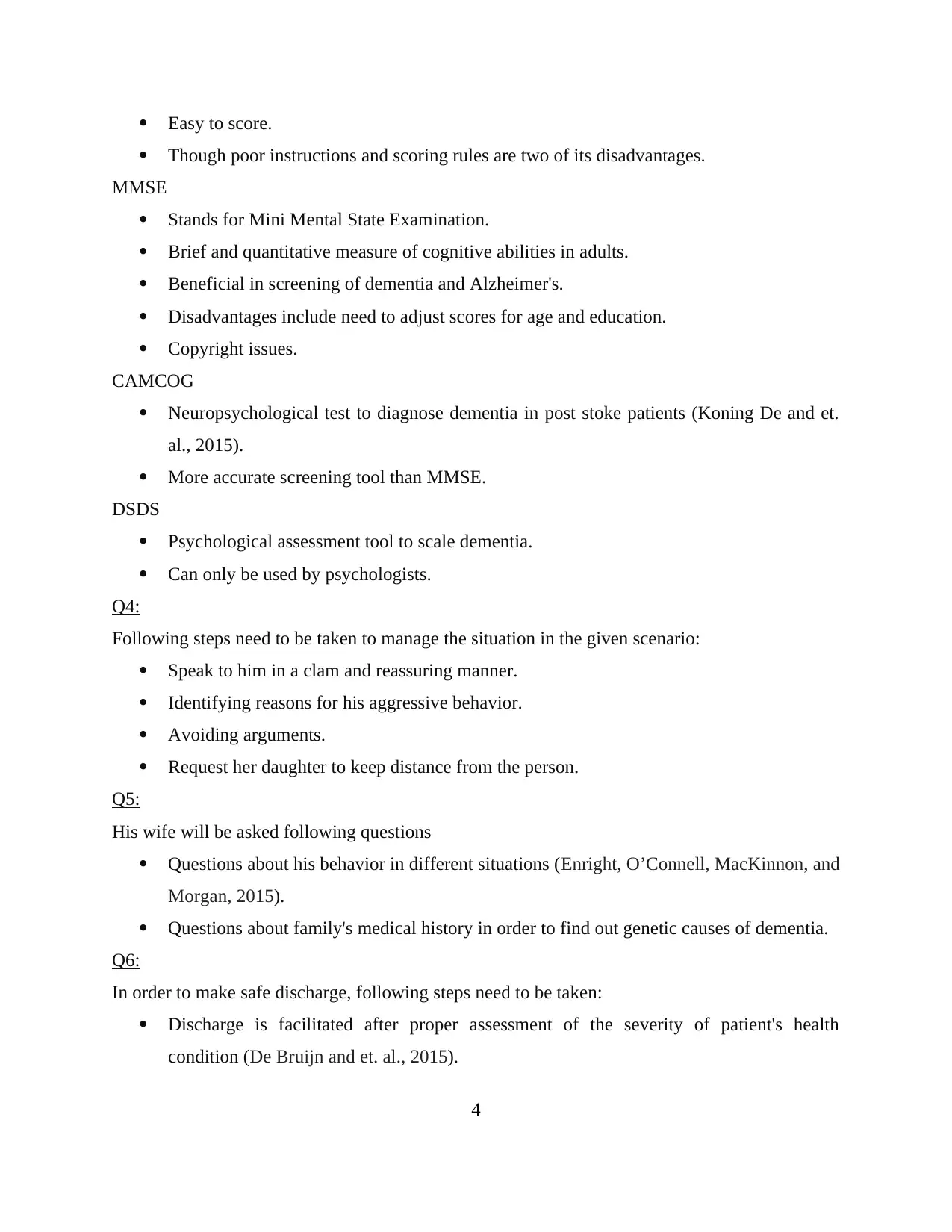
Easy to score.
Though poor instructions and scoring rules are two of its disadvantages.
MMSE
Stands for Mini Mental State Examination.
Brief and quantitative measure of cognitive abilities in adults.
Beneficial in screening of dementia and Alzheimer's.
Disadvantages include need to adjust scores for age and education.
Copyright issues.
CAMCOG
Neuropsychological test to diagnose dementia in post stoke patients (Koning De and et.
al., 2015).
More accurate screening tool than MMSE.
DSDS
Psychological assessment tool to scale dementia.
Can only be used by psychologists.
Q4:
Following steps need to be taken to manage the situation in the given scenario:
Speak to him in a clam and reassuring manner.
Identifying reasons for his aggressive behavior.
Avoiding arguments.
Request her daughter to keep distance from the person.
Q5:
His wife will be asked following questions
Questions about his behavior in different situations (Enright, O’Connell, MacKinnon, and
Morgan, 2015).
Questions about family's medical history in order to find out genetic causes of dementia.
Q6:
In order to make safe discharge, following steps need to be taken:
Discharge is facilitated after proper assessment of the severity of patient's health
condition (De Bruijn and et. al., 2015).
4
Though poor instructions and scoring rules are two of its disadvantages.
MMSE
Stands for Mini Mental State Examination.
Brief and quantitative measure of cognitive abilities in adults.
Beneficial in screening of dementia and Alzheimer's.
Disadvantages include need to adjust scores for age and education.
Copyright issues.
CAMCOG
Neuropsychological test to diagnose dementia in post stoke patients (Koning De and et.
al., 2015).
More accurate screening tool than MMSE.
DSDS
Psychological assessment tool to scale dementia.
Can only be used by psychologists.
Q4:
Following steps need to be taken to manage the situation in the given scenario:
Speak to him in a clam and reassuring manner.
Identifying reasons for his aggressive behavior.
Avoiding arguments.
Request her daughter to keep distance from the person.
Q5:
His wife will be asked following questions
Questions about his behavior in different situations (Enright, O’Connell, MacKinnon, and
Morgan, 2015).
Questions about family's medical history in order to find out genetic causes of dementia.
Q6:
In order to make safe discharge, following steps need to be taken:
Discharge is facilitated after proper assessment of the severity of patient's health
condition (De Bruijn and et. al., 2015).
4
Paraphrase This Document
Need a fresh take? Get an instant paraphrase of this document with our AI Paraphraser
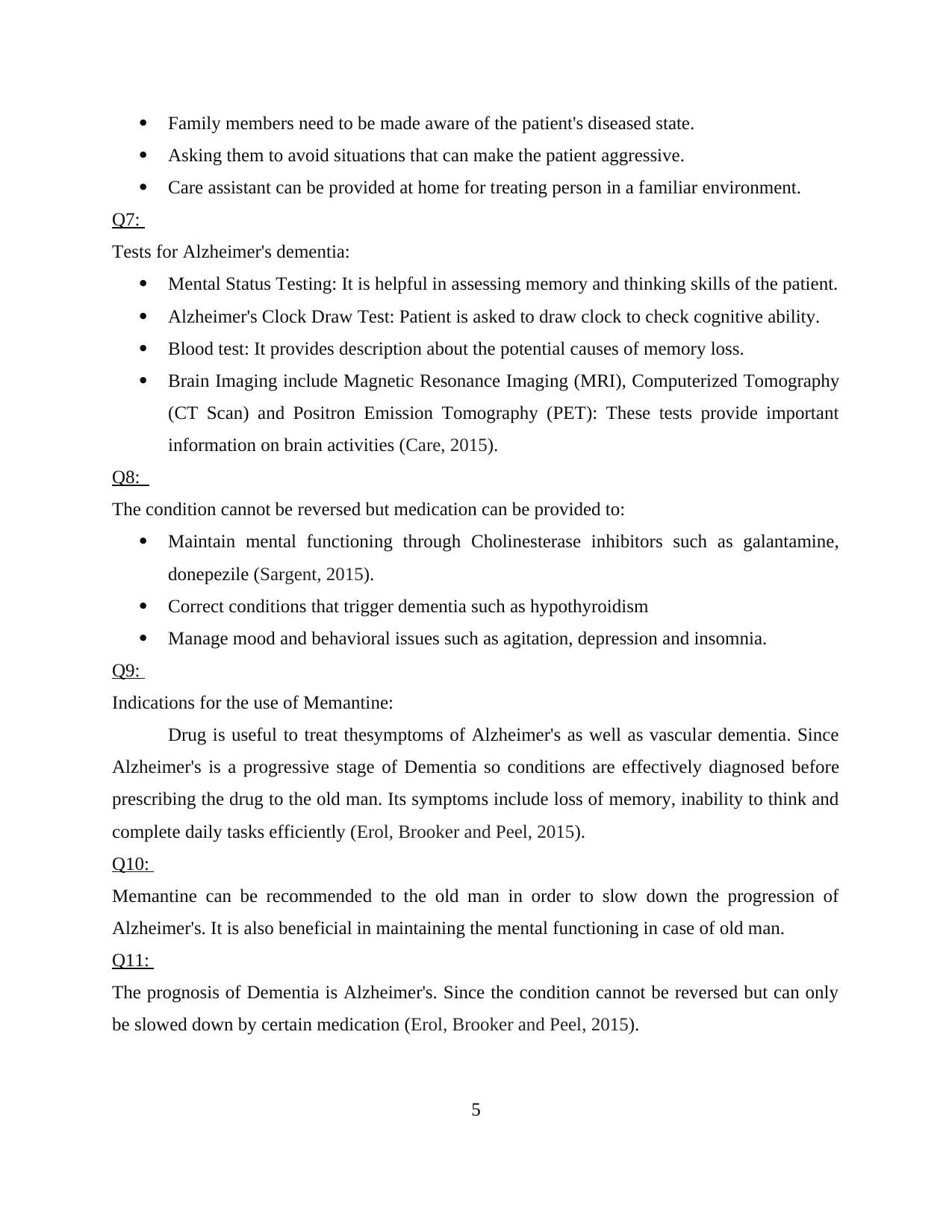
Family members need to be made aware of the patient's diseased state.
Asking them to avoid situations that can make the patient aggressive.
Care assistant can be provided at home for treating person in a familiar environment.
Q7:
Tests for Alzheimer's dementia:
Mental Status Testing: It is helpful in assessing memory and thinking skills of the patient.
Alzheimer's Clock Draw Test: Patient is asked to draw clock to check cognitive ability.
Blood test: It provides description about the potential causes of memory loss.
Brain Imaging include Magnetic Resonance Imaging (MRI), Computerized Tomography
(CT Scan) and Positron Emission Tomography (PET): These tests provide important
information on brain activities (Care, 2015).
Q8:
The condition cannot be reversed but medication can be provided to:
Maintain mental functioning through Cholinesterase inhibitors such as galantamine,
donepezile (Sargent, 2015).
Correct conditions that trigger dementia such as hypothyroidism
Manage mood and behavioral issues such as agitation, depression and insomnia.
Q9:
Indications for the use of Memantine:
Drug is useful to treat thesymptoms of Alzheimer's as well as vascular dementia. Since
Alzheimer's is a progressive stage of Dementia so conditions are effectively diagnosed before
prescribing the drug to the old man. Its symptoms include loss of memory, inability to think and
complete daily tasks efficiently (Erol, Brooker and Peel, 2015).
Q10:
Memantine can be recommended to the old man in order to slow down the progression of
Alzheimer's. It is also beneficial in maintaining the mental functioning in case of old man.
Q11:
The prognosis of Dementia is Alzheimer's. Since the condition cannot be reversed but can only
be slowed down by certain medication (Erol, Brooker and Peel, 2015).
5
Asking them to avoid situations that can make the patient aggressive.
Care assistant can be provided at home for treating person in a familiar environment.
Q7:
Tests for Alzheimer's dementia:
Mental Status Testing: It is helpful in assessing memory and thinking skills of the patient.
Alzheimer's Clock Draw Test: Patient is asked to draw clock to check cognitive ability.
Blood test: It provides description about the potential causes of memory loss.
Brain Imaging include Magnetic Resonance Imaging (MRI), Computerized Tomography
(CT Scan) and Positron Emission Tomography (PET): These tests provide important
information on brain activities (Care, 2015).
Q8:
The condition cannot be reversed but medication can be provided to:
Maintain mental functioning through Cholinesterase inhibitors such as galantamine,
donepezile (Sargent, 2015).
Correct conditions that trigger dementia such as hypothyroidism
Manage mood and behavioral issues such as agitation, depression and insomnia.
Q9:
Indications for the use of Memantine:
Drug is useful to treat thesymptoms of Alzheimer's as well as vascular dementia. Since
Alzheimer's is a progressive stage of Dementia so conditions are effectively diagnosed before
prescribing the drug to the old man. Its symptoms include loss of memory, inability to think and
complete daily tasks efficiently (Erol, Brooker and Peel, 2015).
Q10:
Memantine can be recommended to the old man in order to slow down the progression of
Alzheimer's. It is also beneficial in maintaining the mental functioning in case of old man.
Q11:
The prognosis of Dementia is Alzheimer's. Since the condition cannot be reversed but can only
be slowed down by certain medication (Erol, Brooker and Peel, 2015).
5
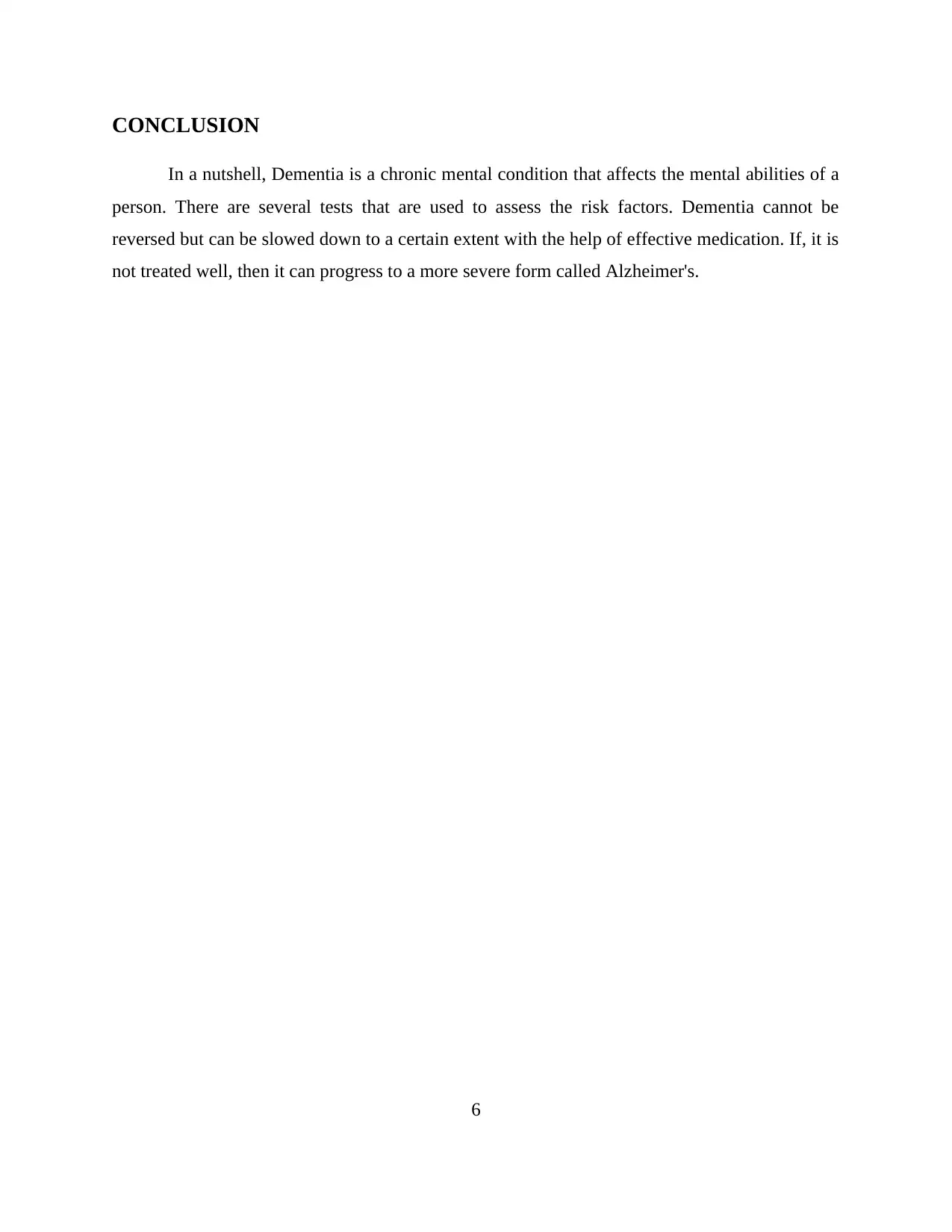
CONCLUSION
In a nutshell, Dementia is a chronic mental condition that affects the mental abilities of a
person. There are several tests that are used to assess the risk factors. Dementia cannot be
reversed but can be slowed down to a certain extent with the help of effective medication. If, it is
not treated well, then it can progress to a more severe form called Alzheimer's.
6
In a nutshell, Dementia is a chronic mental condition that affects the mental abilities of a
person. There are several tests that are used to assess the risk factors. Dementia cannot be
reversed but can be slowed down to a certain extent with the help of effective medication. If, it is
not treated well, then it can progress to a more severe form called Alzheimer's.
6
You're viewing a preview
Unlock full access by subscribing today!
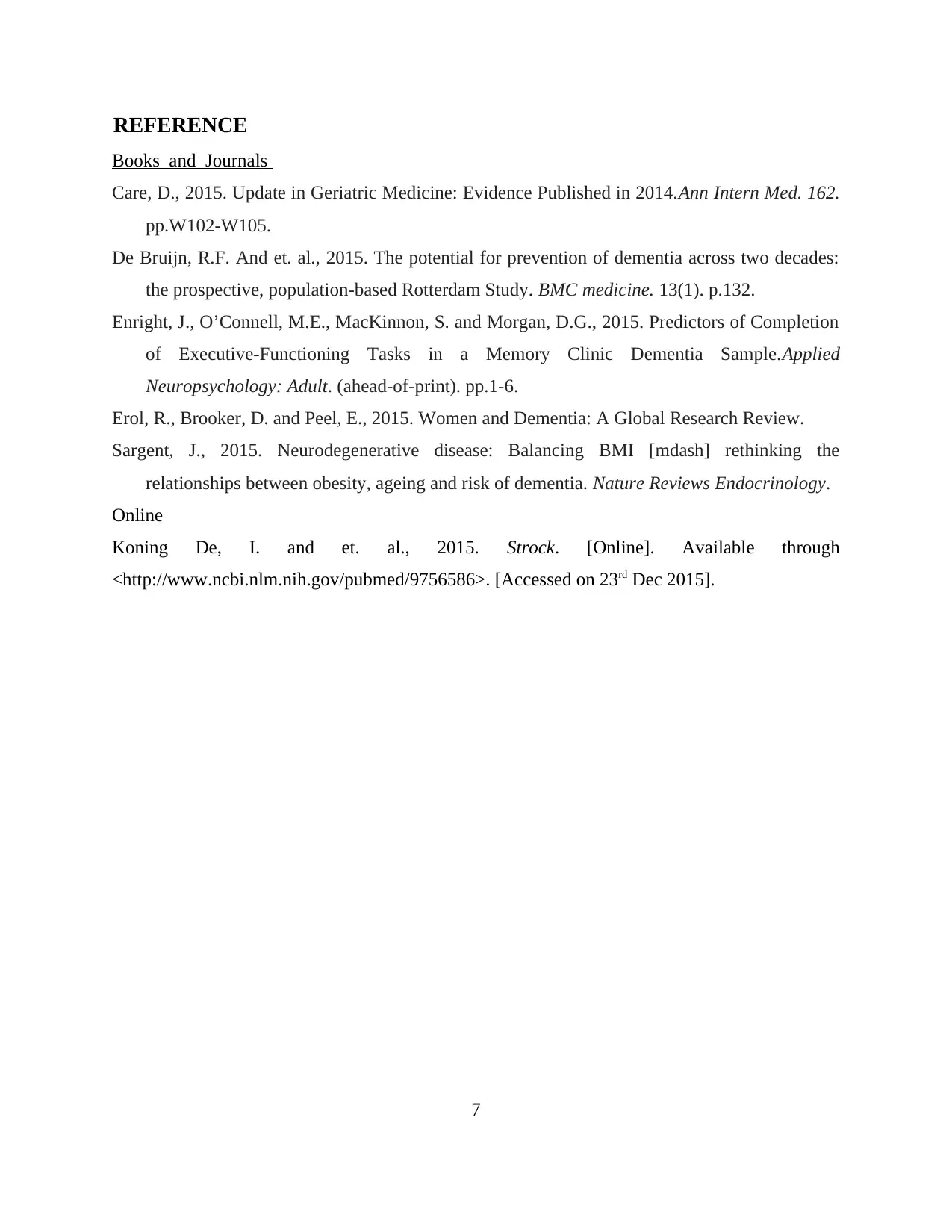
REFERENCE
Books and Journals
Care, D., 2015. Update in Geriatric Medicine: Evidence Published in 2014.Ann Intern Med. 162.
pp.W102-W105.
De Bruijn, R.F. And et. al., 2015. The potential for prevention of dementia across two decades:
the prospective, population-based Rotterdam Study. BMC medicine. 13(1). p.132.
Enright, J., O’Connell, M.E., MacKinnon, S. and Morgan, D.G., 2015. Predictors of Completion
of Executive-Functioning Tasks in a Memory Clinic Dementia Sample.Applied
Neuropsychology: Adult. (ahead-of-print). pp.1-6.
Erol, R., Brooker, D. and Peel, E., 2015. Women and Dementia: A Global Research Review.
Sargent, J., 2015. Neurodegenerative disease: Balancing BMI [mdash] rethinking the
relationships between obesity, ageing and risk of dementia. Nature Reviews Endocrinology.
Online
Koning De, I. and et. al., 2015. Strock. [Online]. Available through
<http://www.ncbi.nlm.nih.gov/pubmed/9756586>. [Accessed on 23rd Dec 2015].
7
Books and Journals
Care, D., 2015. Update in Geriatric Medicine: Evidence Published in 2014.Ann Intern Med. 162.
pp.W102-W105.
De Bruijn, R.F. And et. al., 2015. The potential for prevention of dementia across two decades:
the prospective, population-based Rotterdam Study. BMC medicine. 13(1). p.132.
Enright, J., O’Connell, M.E., MacKinnon, S. and Morgan, D.G., 2015. Predictors of Completion
of Executive-Functioning Tasks in a Memory Clinic Dementia Sample.Applied
Neuropsychology: Adult. (ahead-of-print). pp.1-6.
Erol, R., Brooker, D. and Peel, E., 2015. Women and Dementia: A Global Research Review.
Sargent, J., 2015. Neurodegenerative disease: Balancing BMI [mdash] rethinking the
relationships between obesity, ageing and risk of dementia. Nature Reviews Endocrinology.
Online
Koning De, I. and et. al., 2015. Strock. [Online]. Available through
<http://www.ncbi.nlm.nih.gov/pubmed/9756586>. [Accessed on 23rd Dec 2015].
7
1 out of 7
Your All-in-One AI-Powered Toolkit for Academic Success.
+13062052269
info@desklib.com
Available 24*7 on WhatsApp / Email
![[object Object]](/_next/static/media/star-bottom.7253800d.svg)
Unlock your academic potential
© 2024 | Zucol Services PVT LTD | All rights reserved.

